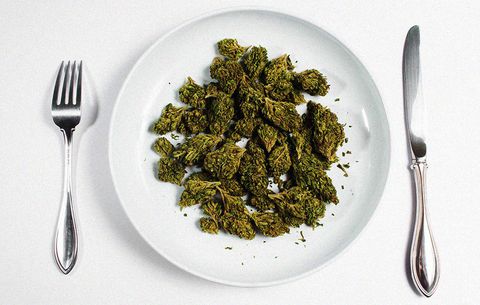Munchies won’t make you fat: Study reveals cannabis consumers weigh less than non-users
Michigan state scientists pulled data from the National Epidemiologic Survey of Alcohol and Related Conditions

What is the relationship between cannabis and your body? Based on the results of a new study from Michigan State University scientists, smoking the green stuff won’t necessarily cause you to pile on the pounds.
In fact, non-consumers who participated in the study had more body fat than those who puffed the herb, which makes one wonder why weed has been tarnished with the reputation as a hunger-inducing herb.
The intriguing findings were provided by a team of researchers at Michigan State University and published in the International Journal of Epidemiology last month. In order to ascertain the connection between cannabis consumption and weight, Michigan state scientists pulled data from the National Epidemiologic Survey of Alcohol and Related Conditions.
The information they gleaned from the survey included the Body Mass Index (BMI) of 33,000 participants. All participants were aged 18 or over and the data of cannabis consumers were analyzed in comparison with non-users.
“Over a three-year period, all participants showed a weight increase, but interestingly, those who used [cannabis] had less of an increase compared to those that never used,” said the lead study author and assistant professor of family medicine, Omayma Alshaarawy, in a press release. “Our study builds on mounting evidence that this opposite effect occurs.”
Not a major difference, but consistencies were noticeable
Although the average weight for cannabis consumers, typically smokers, was lower than those who abstain from the drug, the differences were not monumental. The average difference in weight for a 5-foot-7 participant weighing around 200 pounds at the beginning of the study was two pounds.
This variance in weight between non-cannabis consumers and cannabis consumers was determined from the entire pool of 30,000 study subjects.
“An average 2-pound difference doesn’t seem like much, but we found it in more than 30,000 people with all different kinds of behaviors and still got this result,” Alshaarawy said regarding the weight discrepancy.
Currently, the study researchers are not completely sure why the phenomenon is occurring, especially since the cannabis plant is known to trigger bouts of hunger. While it could be related to behavioral changes following cannabis consumption, the lower body mass index of cannabis-consuming study subjects may be occurring as a direct effect of the plant’s impact on the body’s cellular composition.
Doctors are not recommending that patients spark up a doobie to fight weight gain, however.
“There’s too many health concerns around cannabis that far outweigh the potential positive, yet modest, effects it has on weight gain,” Alshaarawy said. “People shouldn’t consider it as a way to maintain or even lose weight.”
You can read the full study Michigan State University study here.







